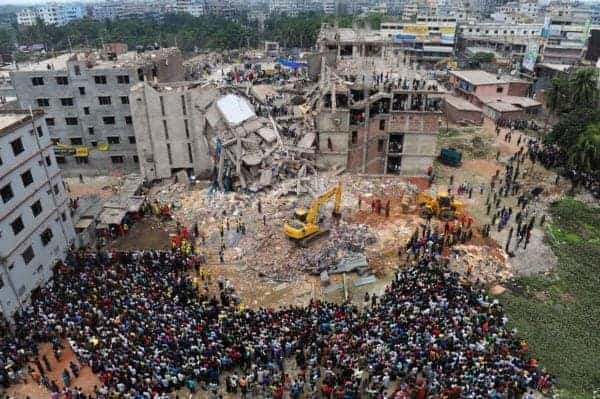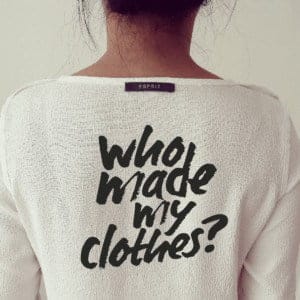The Story of an Apple
When you buy an apple from grocery store A, you give them money and you receive an apple. Effectively, you are supporting that business as well as the livelihoods of the people who work there.
If you suddenly learned that grocery store A was overworking employees, underpaying them, and lobbying against raising wages, you might have second thoughts about shopping there. So you decide to start going to grocery store B, which has better practices and allows your dollars to have a positive impact on people’s lives.
If you dig a little deeper into where the apple came from, you’re also supporting the farm that grew your apple, and the people who work there. If it’s organic you’re supporting a farm that doesn’t use environmentally harmful pesticides, and if it’s not you’re supporting a farm that uses those harmful pesticides.
None of us want to give money and power to an entity that does harm. We feel guilty and sometimes betrayed. With the privilege of choice, we have the power to put our money to work for our values, and if everyone did this we could literally change the world.
An important point of distinction here is that not everyone has the privilege of choice. Some folks shop purely based on price and need to go with the cheapest option. However, if you have the means to make a choice, then you also have the power to make a difference.
Why Clothing Is A Whole Lot Messier
When it comes to food our impact is somewhat straightforward but when we switch to clothing it becomes a whole lot murkier. Lack of information means we don’t always know what the impact of our clothes is, and the reason for this is simple: transparency or the lack of it.
Transparency is the key to letting us know the impact of our clothes. It tells else who made our clothes, where the factory is, if workers make a living wage, where the fabric came from, and a whole lot more. Without this, we could be buying clothes that were made with slave labor or child labor, and we have no idea.
Transparency is critical for accountability, and Fashion Revolution is an organization that understands this problem quite well. Their vision states “We believe in a fashion industry that values people, the environment, creativity and profit in equal measure”.
Every year Fashion Revolution puts out an updated Transparency Index which ranks the top global fashion brands on how transparent their supply chains are. The index ranks these brands from 0-100, 100 being the best score, and so far none of the brands ranked score above 51-60. The lowest scoring brands in 2021, which have virtually no transparency, include brands like Fashion Nova, SHEIN, Nine West, and DKNY. For the full list of brands check out the report.
Why Transparency Matters
Now you might be wondering, “ok, but does all this transparency really matter?” It’s a valid question, so let’s take a step back in time to remember what happens when transparency doesn’t exist.
On April 24th, 2013 the Rana Plaza building collapsed in Bangladesh, killing 1,138 people and injuring another 2,500. This garment factory was structurally unsafe, and while there were warning signs the day before the incident, the workers were still told to come into work the next day. This marked the fourth largest industrial disaster in history.

The big question here is why a clothing factory was allowed to be this unsafe, and that’s where things get hairy. This factory wasn’t owned by any one brand, but instead many top fashion brands sub-contracted to this factory. Since those brands didn’t have to disclose their supply chain, the factory could effectively be unsafe and unregulated. This is exactly why we can no longer accept lack of transparency as the standard operating procedures.
How the Industry is Changing
This disaster also spawned the birth of Fashion Revolution and the worldwide movement for more ethical and sustainable fashion industry practices. People have taken action globally every year, especially heightened during Fashion Revolution Week, to demand that this type of disaster never happens again. Even one life lost is too high a cost to pay for the clothes on our backs.
The demand for ethical and sustainable fashion is on the rise, and you can see this in the rise of new brands and new startups helping people make a positive impact with their dollars. From the rise of Fashion Revolution to the popularity of new brands like Adelante Shoe Company and Nisolo, this is a trend that’s here to stay.
With more information on the rise the choice is becoming easier: do you want to make a positive impact with your clothing purchase, or are you comfortable not knowing the impact, not knowing whether the workers who made your shirt were paid fairly or treated ethically? Seem like a pretty easy choice.
People and Planet
Despite the positive momentum, this problem is still quite large and it’s a problem that touches both people and planet. First let’s talk about the people.
The fashion industry employs 40 million garment workers globally, according to The Trust Cost and 85% of those workers are women. These are some of the lowest paid workers in the world.
Sometimes working conditions even drive workers to suicide, such as was seen recently in South India. Additionally, lack of transparency can allow for practices like slave labor and child labor to take place.
Now let’s talk about the planet. A quarter of the world’s chemicals are used for textile production and the industry uses more water than any other industry except agriculture.
Basically, this is a big industry with big problems, and that means we have a big opportunity to make big changes. By buying less, and buying from brands that make a positive impact on people and planet, we can make all make a difference. In other words…
Dress like you give a damn.
Let’s Change the World
Here’s a short list of actions you can take today to start making positive changes to the fashion industry.
- Shop ethically
Buy clothes from brands that are pushing the envelope on ethical and sustainable business. For example, Outland Denim is among our highest ranking sustainable brands. Thousand Fell created a circular sneaker that can be sent back and recycled when they wear out!
You can shop over 100 thoroughly researched ethical brands here at Eco-Stylist.
- Ask your favorite brand “who made my clothes?”

Take a picture of yourself wearing one of your favorite pieces of clothing with the tag facing out, and holding a sign that says “Who Made My Clothes?”. Then post it to Instagram, tagging that brand and using the hashtag #whomademyclothes. Alternatively, you can email or tweet at the brand, asking the same question!
- Get involved in Fashion Revolution Week
The next Fashion Revolution Week is April 22nd – April 27th 2025. Mark your calendars and plan to get involved. The week will be full of actionable steps like posting a #whomademyclothes post to IG, reaching out to high street fashion brands, marches, and much more!
*Article updated 04/12/23.

Garik Himebaugh is the founder of Eco-Stylist, the go-to resource to find ethical clothing. He’s also a sustainable personal stylist and international speaker on all things sustainable fashion. Garik loves coffee, climbing, and clothes.









